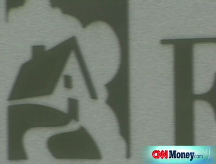Fannie, Freddie plunge again
Shares of the two mortgage giants drop more than 20% in continued Wall Street nervousness over housing market woes.

NEW YORK (CNNMoney.com) -- Battered mortgage giants Fannie Mae and Freddie Mac took yet another hit on Wednesday as concerns grew about a possible government bailout.
Shares of Fannie (FNM, Fortune 500) fell nearly 27% while Freddie (FRE, Fortune 500) tumbled about 22% in heavy trading on the New York Stock Exchange. More than 200 million shares of both Fannie and Freddie exchanged hands Wednesday -- nearly four times their average daily trading volume.
Prior to today's declines, shares were already down 20% this week. Each has plunged nearly 90% in 2008.
Wall Street has been concerned about Fannie and Freddie's need to raise capital, and the possibility of a government bailout that could make the stocks worthless for private investors.
Fannie and Freddie are crucial to the housing market. The two government sponsored enterprises collectively own or back more than $5 trillion in mortgages, or half the nation's mortgage debt.
Both companies have been losing money for the past few quarters due to the subprime mortgage meltdown and steep declines in housing prices.
Fannie CEO Daniel Mudd tried to alleviate concerns about a government bailout on Wednesday, when he told National Public Radio that no such plan was imminent.
"They haven't offered anything and we haven't asked for anything," said Mudd to NPR. "I don't anticipate that they will do that."
In the latest sign of trouble, Freddie had to pay a borrowing premium Tuesday, when it issued $3 billion worth of five-year debt. Freddie's interest rate was 1.13 percentage points higher that the standard federal government rate, and was a 10-year high for the lender.
On July 30, President Bush signed into law a housing bill to boost Fannie and Freddie. The bill gave the Treasury Department the authority to loan unlimited amounts of money to Fannie and Freddie and also allows for Treasury to buy up shares of the two firms if necessary.
The price tag on a government bailout is likely to be costly, with estimates ranging from $25 billion to $100 billion.
Fannie spokeswoman Amy Bonitatibus declined to comment on the company's stock activity or any plans to meet with the Treasury about a bailout. Spokesmen for Freddie Mac were not immediately available for comment.
A spokesperson for the Treasury Department had no comment about Fannie or Freddie. ![]()




